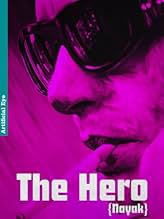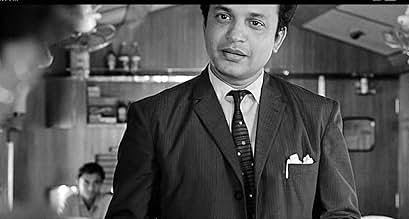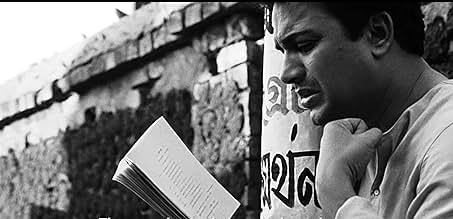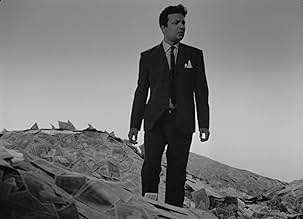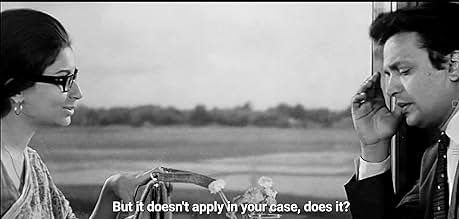CALIFICACIÓN DE IMDb
8.3/10
5.4 k
TU CALIFICACIÓN
Agrega una trama en tu idiomaEn route to Delhi to receive an award, a Bengali film star reevaluates his success through his fellow passengers, dreams, and past experiences.En route to Delhi to receive an award, a Bengali film star reevaluates his success through his fellow passengers, dreams, and past experiences.En route to Delhi to receive an award, a Bengali film star reevaluates his success through his fellow passengers, dreams, and past experiences.
- Premios
- 8 premios ganados y 1 nominación en total
Kamu Mukherjee
- Pritish Sarkar
- (as Kamu Mukhopadhyay)
Susmita Mukherjee
- Molly (Mr. Sarkar's wife)
- (as Susmita Mukhopadhyay)
Subrata Sensharma
- Ajoy
- (as Subrata Sen)
Jogesh Chatterjee
- Aghore, elderly journalist
- (as Jogesh Chattopadhyay)
Satya Banerjee
- Swamiji
- (as Satya Bandyopadhyay)
Argumento
¿Sabías que…?
- TriviaDirector Satyajit Ray had written the script of this movie considering only Uttam Kumar in the lead role. He had confessed that if Uttam Kumar had refused it, he would've abandoned the project altogether.
- Citas
Arindam Mukherjee: There's no scope of overacting in front of camera; if you overact a little, then it will magnify tenfold in the camera.
- ConexionesReferenced in Autograph (2010)
Opinión destacada
Satyajit Ray's Nayak tells the story of a film star. Of course, in mainstream Indian cinema, leading men are known as heroes, and the interesting paradox about the star of this film (which is probably true of most film stars who enjoy great public adulation) is that beneath this fake façade of stardom, fans, and fame, lies a man with a truly wounded soul, someone who has seemingly accomplished everything in his career but has actually accomplished nothing of what he would have probably wished for, both a person and and as an artiste. A very interesting concept of course which is adapted onto the screen in a most authentic and engaging picture. The film might not be Ray's best film, but it's still Ray's film after all, so how can one even expect anything less than that.
Satyajit Ray is, needless to say (sometimes even embarrassing to have to say that), a master director, a master storyteller, and this film is no exception in the illustrious list of evidence to his talent. Nayak is meaningful, highly absorbing, and to me it's a visual treat. The camera work and lighting are spectacular for a black-and-white film, and the setting of most of the story within a train makes for a delightful watch not only visually but culturally. Culturally because the decorative elegance, the restaurant, the order, as well as the crowd of passengers, wouldn't normally be associated with Indian trains of that period and might raise several eyebrows among non-Indians. The moving train demonstrates breathtaking views as the script moves through its conversational episodes.
Nayak works as a story, as a film, but in many ways as a poem, full of hidden, thought-provoking messages, and as a psychology textbook full of interesting insights of the human soul. The film also provides the viewer with a glimpse into the world of filmmaking from the actors' standpoint. While the story of a film hero who is actually nothing of the sort in real life is actually not big news to anyone nor is it a terribly original idea for a film, Ray makes it into such a personal story that the lead character's being an actor becomes just a random plot element. Ray takes us into his troubled world and does so with extraordinary symbolism. Take the dream sequences just as an example of Ray's profound mastery.
Naturalistic acting is to be expected in Ray films. Uttam Kumar is excellent in this author-backed role. Very few films of that era, not only in India, allowed this much of character depth and complexity, in fear of confusing the moviegoing public, but Ray knew how to balance it well, and Kumar plays the mix of Arindam's stylish appearance and inner conflict exceedingly well. Sharmila Tagore is luminous as the young, morally upright and compassionate journalist who learns to see the person behind the star and the story behind the item. She is grace personified with her elegant demeanor and restrained delivery. These two make this film what it is, and their interactions give the film its intellectual weight. The conclusion of the story is more than optimistic thanks to Ray's keen, optimistic vision.
Satyajit Ray is, needless to say (sometimes even embarrassing to have to say that), a master director, a master storyteller, and this film is no exception in the illustrious list of evidence to his talent. Nayak is meaningful, highly absorbing, and to me it's a visual treat. The camera work and lighting are spectacular for a black-and-white film, and the setting of most of the story within a train makes for a delightful watch not only visually but culturally. Culturally because the decorative elegance, the restaurant, the order, as well as the crowd of passengers, wouldn't normally be associated with Indian trains of that period and might raise several eyebrows among non-Indians. The moving train demonstrates breathtaking views as the script moves through its conversational episodes.
Nayak works as a story, as a film, but in many ways as a poem, full of hidden, thought-provoking messages, and as a psychology textbook full of interesting insights of the human soul. The film also provides the viewer with a glimpse into the world of filmmaking from the actors' standpoint. While the story of a film hero who is actually nothing of the sort in real life is actually not big news to anyone nor is it a terribly original idea for a film, Ray makes it into such a personal story that the lead character's being an actor becomes just a random plot element. Ray takes us into his troubled world and does so with extraordinary symbolism. Take the dream sequences just as an example of Ray's profound mastery.
Naturalistic acting is to be expected in Ray films. Uttam Kumar is excellent in this author-backed role. Very few films of that era, not only in India, allowed this much of character depth and complexity, in fear of confusing the moviegoing public, but Ray knew how to balance it well, and Kumar plays the mix of Arindam's stylish appearance and inner conflict exceedingly well. Sharmila Tagore is luminous as the young, morally upright and compassionate journalist who learns to see the person behind the star and the story behind the item. She is grace personified with her elegant demeanor and restrained delivery. These two make this film what it is, and their interactions give the film its intellectual weight. The conclusion of the story is more than optimistic thanks to Ray's keen, optimistic vision.
- Peter_Young
- 20 sep 2021
- Enlace permanente
Selecciones populares
Inicia sesión para calificar y agrega a la lista de videos para obtener recomendaciones personalizadas
- How long is The Hero?Con tecnología de Alexa
Detalles
- Tiempo de ejecución1 hora 57 minutos
- Color
- Mezcla de sonido
- Relación de aspecto
- 1.37 : 1
Contribuir a esta página
Sugiere una edición o agrega el contenido que falta


